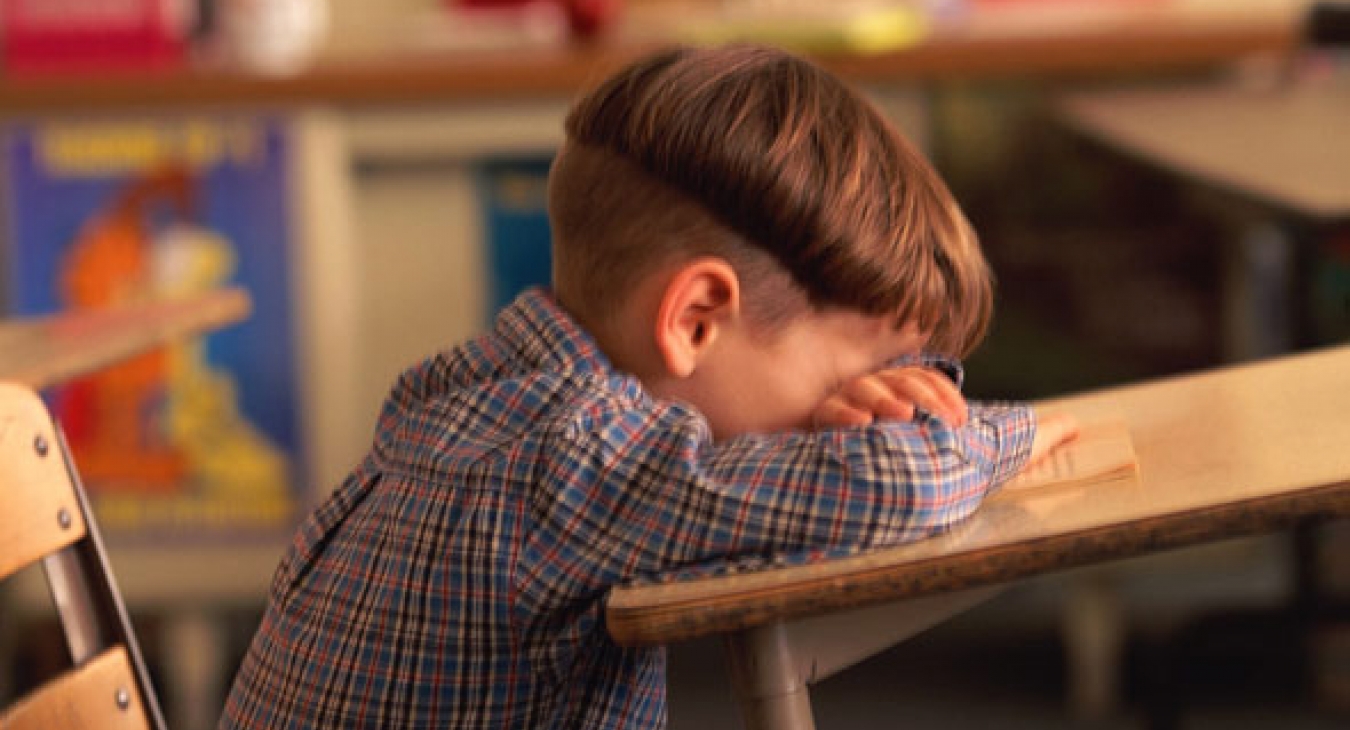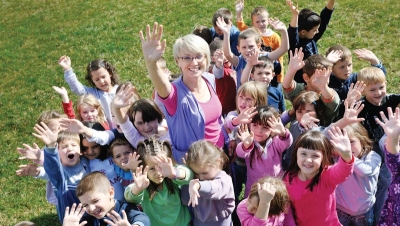Despite overwhelming evidence that periods of unstructured play and social interaction are a crucial part of children’s cognitive, academic, physical and mental wellness, schools continue to take away recess privileges as a penalty for academic or behavioral transgressions. I’ve done it, many times. When students fail to hand in assignments or when a child acts up in class, I’ve taken their recess privileges hostage. I did it both as a way of punishing for bad behavior or as a way to carve out a few extra minutes of learning time in an otherwise packed day.
Unfortunately, I’m not alone. According to a Gallup poll commissioned by the Robert Wood Johnson Foundation, 77 percent of school principals report that they withhold recess as punishment, even as they simultaneously sing the praises of recess as a factor in academic, cognitive, and social development. In that same report, eight in 10 principals acknowledge that time to play has a “positive impact on achievement,” and two-thirds of principals state that “students listen better after recess and are more focused in class.” Read about the IPEMA 2017 survey and 2018 survey.
In response to this common disciplinary practice, as well as the overall declining rates and duration of recess in this country, the American Academy of Pediatrics recently issued a policy statement, “The Crucial Role of Recess,” to set the record straight and make recommendations to schools. Their stance is unequivocal: “recess offers cognitive, social, emotional, and physical benefits that may not be fully appreciated when a decision is made to diminish it.” In other words, schools should keep recess on the schedule, and teachers like me shouldn’t take it away.
The physical benefits of recess to all students, particularly the 17 percent of American children who are classified as obese, are clear. In our increasingly sedentary society, it can be a challenge to ensure that children get the recommended 60 minutes of moderate to vigorous physical activity every day, and recess can help bridge that gap.
Recess also plays an important role in the ability to maintain self-control during class time. Self-control is not an unlimited resource, and by the time unstructured play rolls around, most children have depleted their reserves. They have had to resist the temptation to wiggle, eat the piece of cookie someone left on the carpet or talk to their friends in favor of focusing on math facts.
Recess provides an opportunity to refill children’s reserves of self-control through play and expression that’s free from structure, rules, and rigorous cognitive tasks. The pediatrics academy explains: “Optimal cognitive processing in a child necessitates a period of interruption after a period of concentrated instruction. The benefits of these interruptions are best served by unstructured breaks rather than by merely shifting from one cognitive task to another.” Several studies have found that students who enjoy the benefit of recess are more attentive, more productive and better able to learn when they return to the classroom from a period of free play.
Memory is also enhanced by breaks because cognitive rest after learning new material allows that material to be retained for longer periods of time. For optimal cognitive processing and memory consolidation, therefore, children need a period of unstructured free time, even if it is simply in the form of socializing or daydreaming.
Finally, recess helps young children develop social skills, such as negotiation, social dynamics, and the use of subtle verbal and non-verbal communication cues. As our children’s schedules become more regimented and structured, and free-play time retreats indoors in favor of video games over kick the can and stickball, recess is the only opportunity many children have to learn these skills.
When I asked Michele Borba, an educational psychologist and former teacher, about the implications of withholding students’ recreational time, she was adamant in her support of recess as an essential educational activity. “The highest correlation to school success is a kid sitting in a seat, focused and eager to learn, but kids who lose recess lose that, and a lot more.” According to Ms. Borba, students who are kept in at recess stand to lose:

















I couldnt agree more
I couldnt agree more
Kiddo
We have started saying as kind of as an affectionate term, it's been said for a few years now...
Totally agree there is so
Totally agree there is so much pressure on children these days to take recess is actually punishment to the teacher. These kids need to release some energy. Kids are not allowed to be kids anymore. I was in education for 35yrs the last 10 or so was such a dramatic change in the pressure on kids. Besides the standardized testing the extra homework the AR test projects it all leaves little time for family life or extracurricular activities. Soja take that 30 minute recess as punishment not sure that's the best way to handle things. Also realizing they do need consequences for poor Behavior. Many children have no help at home to do projects homework reading and all the other things that are required. I think we need to reevaluate a lot of things in education. It's a different world.
My son's elementary school
My son's elementary school makes the kids walk for a set amount of time. There's a teacher at every recess who's job it is to call the times. Different actions call for more walking time. I've always loved this bc he us still outside being active and will get at least a little free time when he's done his time
Neuroscience
I graduated with a Neuroscience degree and I couldn't agree more. This is not a case of being liberal, it is a case of giving children what they neurologically, physically, socially and developmentally NEED! We wouldn't take away lunch because children need more learning time. If the American Academy of Pediatrics says recess is CRUCIAL, why would an institute who teaches so many children ignore that? Ignoring this need causes actual harm neurologically. You can see some manifestations of it when children rock, shake, act out, and check out mentally. Classrooms should not look like mental hospitals and right now some do, including all of the same types of medicines being administered to reduce these symptoms, except, do these children NEED the medication, or do they NEED recess...
Great idea!
Love these ideas! If we think of discipline as teaching or helping children do things right instead of punishing, children will be motivated to be better instead of act out because they are being punished.
Kiddo
When did we begin referring to children as, Kiddo or Kiddos? In my 40 plus years of working with children in various settings, this seems to be a fairly new thing. Really, just wondering.
The best solution I've heard
The best solution I've heard of is at an elementary school in Woodford Co, Kentucky. The student's punishment is walking a certain number of laps (more laps for more serious infractions) around the playground before they can play freely. They have the option of walking quickly or running to finish more quickly and earn more play time.
I couldn't agree with you
I couldn't agree with you more about homework being excessive in the elementary years. When you add together the hours of sitting at a school desk to the time expected at home sitting a table doing more work, kids these days are putting in longer "work days" than most adults. It breeds early burn-out and fails to foster a love of learning. Not to mention lack of physical activity comes with a huge cost for one's health. And yes, as a parent, I did feel the family was being held hostage to the kid's piles of weekly homework, especially special assignments to be completed over a "holiday break." Although our child could do AP and honors courses (now in high school), we discourage it because of the out of control homework that increases burn-out and would dramatically interfer with the business of growing up and having a wide and varied range of experiences.
Education Policy
For kindergarten it must be made crutial to make the learning process a fun for students. In areas where education system realise on number game or just marks in the exams practice the recess ban most.hi
http://jolly-phonics.blogspot.com/2016/03/Jolly-Phonics.html?spref=fb&m…
Visit www.nofas.org for some
Visit www.nofas.org for some great information about FASD. I have a student with that diagnosis this year and those children are so different than any type of student you've had before. It's very eye opening to read about the disorder! I hope your year improves!
Times have changed
Parenting has truly changed over the years. I believe many behaviors can be linked to the home. Many parents are leaving electronics to care for their children rather than constructive outdoor play or board games. Family time brings confidence and stability. Without it we see children reaching out for attention, but we diagnose behavior issues. A "long time ago" needs to return, but needs to return with parenting so teachers can educate with minimal need to discipline.
To recess or not
The AAP is reflecting what is already being seen in the business world. Employers are finding that they need to provide their employees with more break times to increase productivity. Marketing firms for example have found that in the creative process, there needs to be a 5-10 minute break each hour in order to process and consolidate ideas.
There is a gap in how many educators understand the developmental needs of students and the "whys" of their behaviors. We, as a society, need to begin to see students as needing skill development and not constantly punishment for inability. Let's ask "why" a student is not getting their work done at the same pace as their peers, not assume lack of motivation.
Punishment and consequences
"What punishment would work?"
"What can I do to get across to them for not doing their school work?"
One of the greatest motivators of all time...a failing grade.
It accomplishes two things.
They feel the legitimate failure of the inattentive behavior, and if you require a signature and get one without the child's improvement, you know which parents actually want to be involved with their children.
To parents who don't want their children "publicly shamed" by physical exercise as a punishment during recess: Parent better.
Parents- parent.
Teachers- teach.
You're not raising children in a classroom.
You're teaching them. So, teach them that inattention and lack of effort causes failure. Laziness gets punished, not rewarded. You're handicapped as teachers by a poorly managed educational system, and the way to fix that is to be teachers, not test tutors walking on eggshells worried about feelings.
Consoling a child from harsh words from another child? A given.
Telling them it'll be okay after they receive a failing grade? No. You tell them what can prevent failing grades. Be there if they need help. Remind them it's not the end of the world, but let it stand.
Poor performance is rewarded by failure.
You can be real about it, or you can coddle them all the way up until they're protesting in college for free edyokashun.
I only have a few years before I'm having to remind my daughter's teachers to teach. Don't worry about being her parent, that's what her parents are for. You be teachers. You didn't get to be teachers by being gently pushed without the risk of failure.
Teach. Real Parents Expect nothing less.
Recess
I am a Physical Therapist in a school district and I have seen this (and tried to fight it) for 30 years. There are so many other ways to handle these issues. Some teachers have been receptive to alternatives. I had one boy who was pretty severe ADHD and we would send him to the gym to dry mop it. Pushing that huge dry mop (he was a 1st grader) gave him a lot of proprioceptive feedback and calmed him down. Small trampolines in the classroom with children having free choice to use it when they needed it has worked. Sure, it's a novelty at first but kids get used to it and the ones who need it use it. Rubber tubing around chair legs for them to push against can help. Push ups are a great "encouragement" for better behavior as it gives weight bearing and proprioceptive feedback. Animal walks around the room, jumping jacks, etc. Lots of alternatives to taking away recess.
More unstructured play, not less, is the answer. PE every day, music 2 to 3 times a week...these are the answer to many behavioral problems. Academics occurs during PE...count by 2s, 3s, 5s, etc.
Perhaps you need to look more
Perhaps you need to look more carefully at why it isn't done. It isn't always the child.
K-adults
Like the combination of steps that the students have to do. Wise punishmentpp
Recess
I would just like to add that if a child is constantly having difficulty completing homework or is having behavior issues, he/she should be tested for a learning disability. There are so many different learning issues now. If a child isn't getting it, no amount of missed recess is going to help and will just make the child hate school.
Punishment
If the child doesn't complete homework - which by the way is not developmentally appropriate for an elementary school student - isn't their poor grade enough of a consequence? Why does there need to be any further "punishment"? I mean is the purpose of homework to learn or exercise some sort of power or control over the child/family?
Recess is a necessity!
I come form Norway and have worked as a substitute teacher both in Norway and in the US. Students in Norway have a 10 minute break between every 45 or 90 minute learning block, where they can get some fresh air, play and talk with their friends, get physical exercise, use the rest room and get a drink - and they come back to class recharged and ready to learn! But they do not waste 5 minutes on lining up to walk in a quiet row, the bell rings and they go out, and rings again and they come in. They also have a 20 minute lunch break in the middle of the day. To take away any of the few minutes they are given as a break in the US, you loose benefits to their friendships and the class room atmosphere (they loose time to play and bond), their mood (daylight lifts the mood), their health (physical exercise is already too neglected), and takes the fun away - who does not see these few minutes as the highlight of the day? Please, teachers, let your students play and breathe and make friends for as many minutes as your schedule allows - and you will also see increased concentration, less tensions and more happy learners!
Recess
Ask your teacher is they use Go Noodle. It's very interactive and gets the kids moving throughout the day. Fun songs with choreography that last 2-5 minutes and is shown in a video. Very helpful.
Love the idea of wiggle time!
Love the idea of wiggle time!
I teach in a grade one class.
I teach in a grade one class. We have finish up Friday where 1/2 hour, near the end of the day, the two grade one classes watch a video and those who have work to finish from the week can do that. The video can be curricular based.
Homework for bonus points
My sons teacher use to keep them in from recess to correct homework that was rushed through and for not completing homework. She has recently decided to give them bonus points each day for completed homework. Those points then, go towards their math test grade. Instead of just adding a bonus question on the test. I think her changing to that form is a FANTASTIC idea and rrewards them for doing their homework and trying their best when doing it! Instead of them not getting anything for doing it (except knowledge ;))
It might help them think more positive about homework instead of the negativity and punishment that comes with NOT doing it.
Recess
I don't believe in taking away recess. Kids need down time. Kids need to be kids. Put it simply all children need breaks during the day. They cannot be expected to focused and fully functional for hours at a time. It's exhausting. This will result in a decline in their focus, their motivation and ability to perform in class. I think better strategies need to devised. Think about why a child is acting out/not turning in work/not completing homework/lacking focus. These are not traits of a naughty or a bad child but one who needs help, support, guidance and encouragement. Taking away recess is a negative strategy with negative consequences. Its breeds negativity. I believe positive reinforcements are a better resolution. It gives a child a sense of worth, a positive impact, the ability to flourish, grow and develop.
Recess
Long time ago, but I think there is benefit to going back to a "longer" day. Hold on:)
We went to school 0830-330pm. We had gym/PE daily, music twice a week, a longer lunch time, and a much longer recess time. If we got in trouble at lunch, we helped staff clean up. If we got in trouble on the playground, we had to sit along the wall for a set amount, pending the offense. If we got in trouble during class, a few things happened; a cardboard desk divider was put up, or we were sat out in the hall and eventually talked to by our teacher, we were sent to the principles office, we had to stay late after school, we were given detention. Oh, and our parents were always involved, and they supported our teachers.
I realize staying after school can be difficult related to kids transportation issues, but I bet one or two times of a parent having to disrupt his/her schedule, the child will have additional motivation to do what is expected.
Taking away recess
Taking away recess from a child is awful!!!! This is their only way oh letting their energy out that they have built up all day being in a classroom cooped up!!! My child has missed recess before and I have put a stop to it!!! They child can be pulled away from the situation and talked to about his/her behavior or maybe he/she just needs a minute or 2 just to get away from the situation!!! But taking away a recess is never the right punishment. I feel very highly about this and maybe the reason the child is acting out is bc they are having information overload. The child may just need to be talked to to see what is going on instead of jumping to conclusion and taking away the recess!!! Usually there is something behind the child's behavior!!!! I'm very big on this bc child need sometime to release built up energy from being cooped up inside all day!!! Some child can handle that and some can't!!! So let the child go out and play and find out what is behind the problem before you decide what the punishment might be!!!!
I work in an elementary
I work in an elementary school doing extended day care. So, by the time the kids get to me, they are unbelievably crazy, as they have been sitting in a desk all day learning. Outside recess or a large motor movement game is a must for us!!! However, I do have one older boy (4th grade) who gets too rough with the younger kids, is unable to see what he's doing wrong, and never shows any remorse for his bad actions. I know he often has recess taken away during the day, does anyone have an alternative options to keep this kid moving without giving him the chance to hurt other kids? I have worked with him for 3 years and seem to be absolutely stuck.
Common sense approach
Sara and Jessica, right on target!!
Occupational Therapist
As an occupational therapist who works with pediatrics, I am really pleased to see articles like this getting more attention. Schools need to understand that a child shows better learning when he or she is allowed a good amount of movement throughout the day. It's all related to how our brains process sensory information. It has nothing to do with the "liberal agenda." It's progress in understanding human development and brain function.
Recess
I think tha is an excellent idea! Though some parents will inevitably complain that you are publically shaming their child.
Ketchup sand pickles
If you could devote 20-30 minutes once a week, maybe a Friday afternoonto Ketchups and pickles, you wouldn't have to take recess. Any student that doesn't do work during the week isa Ketchup. Keep blank copies of missed or incomplete assignments for them to do during that time. A student That has had behavior problems can make a behavior action plan, or a behavior reflection sheet. The pickles get to pick a fun activity to do during that time. I know it's hard to fit that in with the instructional demands. However, I like the idea of responsible students being rewarded as well.
Recess as consequence
I've worked as a full time teacher, a substitute teacher for grades k-12, tutor, and now I'm a homeschool history instructor. I've had a variety of students and none were perfect little angels.
I learned a long time ago that to take away recess hurt everyone, especially me, was more trouble than it was worth. A consequence needs to be fairly immediate and relatable to the offence, ime.
Not turning in homework has absolutely no relationship to recess. It's a punishment more than a consequence to remove it for that reason. In fact, the reason the homework might not have been accomplished is that by the time the kid got home, all ability to sit & concentrate had been used up by the school for that day. A consequence would be not to 'earn' a star or a grade until it was accomplished. However, it must be age appropriate. If she's 6 years old -- really? Homework does nothing for that age to help and neither does eliminating recess as a consequence. It fact it's harmful.
If the child is acting up -- move him/her. Trade places or move the desk to "where there's no temptation" to be distracting. You, the teacher, are 'helping', not punishing. Told in those terms, children are less able to identify themselves as the 'bad' one whose job it is to act up. A few minutes into or after recess talking conversationally with the 'offender' could inspire better behavior.
Another 'consequence' can be a countdown to the 'wiggles' or whatever you want to call it. If one kid starts being restless, sure enough, it will be contagious. Use a clock for 5 minutes & down to 'wiggle time', where everyone stands up, jumps in place, shakes, shivers, whatever motion, has a laugh and then sits down to focus again.
If you break up the class time into manageable 15-20 minute segments of concentration with a minute break for everyone, it's much more likely everyone will behave once it gets to be a normal expectation.
A teacher can even ask students what would be best to be able to work through a difficult task or if someone's causing trouble. Get some ideas from them. Engage their minds to get creative on possibilities that could work in classroom management. They might surprise you with creativity, imagination, and willingness.
Recess takeaway
Totally disagree! No wonder America is going down the tubes! I would rather teach them now instead of them growing up and not understanding civic responsibility. Liberal America at its worse! WAHHHHHHHHHHHHHHHHHHHHHHH
Reward System
How about trying a reward system. Use positive reinforcement vs. taking away something that is beneficial to them both physically and academically!
Ok I get what the article is
Ok I get what the article is saying about the importance of recess but I have 2 male students who hurt other students at recess. Also during class time they refuse to do any type of assignments. One is on meds,the other is not, and I am at a loss of how to help these troubled grade 5 students who are seriously affected by fasd.
Have them walk, run, skip,
Have them walk, run, skip, hop, however they choose around the perimeter of the playground by themselves. They are releasing that energy but still being "punished".
Recess as punishment
I totally understand the point about not taking recess away from students who are misbehaving or not getting work turned in. Everyone seems to have an opinion on this...however no one seems to give ideas on alternative consequences. Most parents give time outs, or take away electronics or some other form of consequence when their child does something they shouldn't. Teachers take away recess somewhat like a time out. If you have ideas that would be helpful to teachers, I'm sure they would listen.
Help
So as a parent, how do we get it changed? Also, my son's school only does 1-30 min recess at the END of the day. He's 5....how so we get that changed?
I don't disagree, but what
I don't disagree, but what type of consequence should my students receive when they don't complete homework, act inappropriately in class, etc. There has to be consequences.
Losing recess time
I've often felt conflicted about this, however, it is the only time that I can take from a kiddo and talk to them about their behavior. The most I hold a kiddo in is about 2 minutes. Most of the time it is only 1 minute. I'm sure to them it feels like a lifetime. I can't take time away from anything else during the day and this seems to be the most effective way.